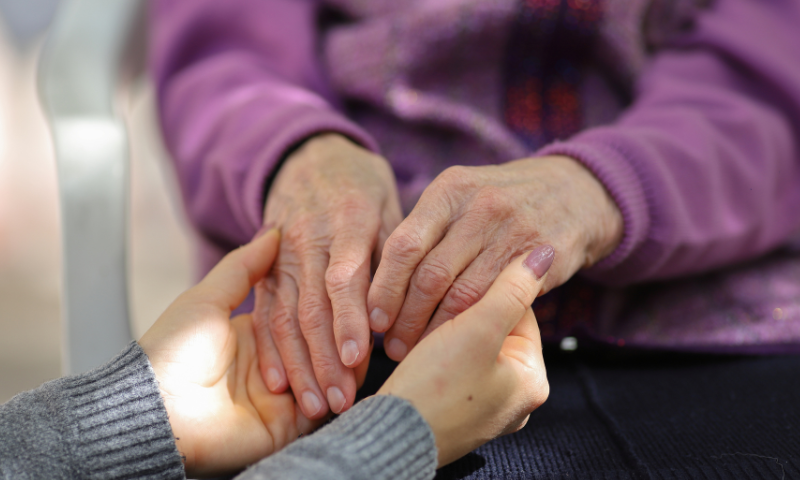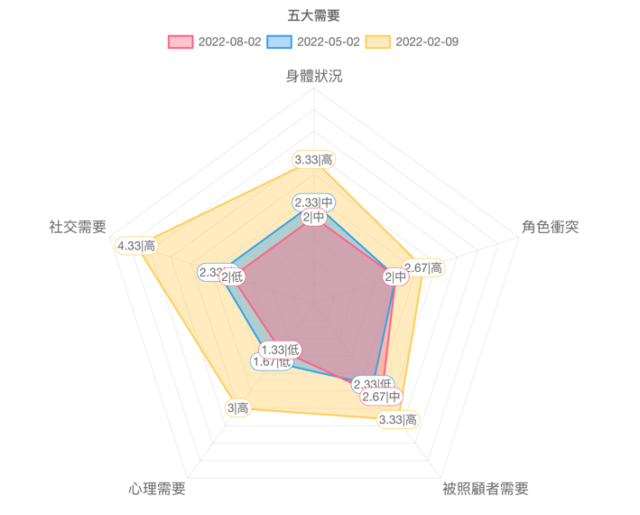
Accessible Planned Greenspace for Creating an Age Friendly City 城市規劃與長者健康
21 August 2024
Pedagogical Activities Invite Students to Perceive Gesture as Knowledge in Public Speaking
29 November 2024Efficient Assessment Tool Helps Identify the Needs and Resources of Family Caregivers of Older Adults

Principal investigator: Prof Ben LI Kin-Kit (Department of Social and Behavioural Sciences)
The declining global fertility rate and extended longevity have significant implications for the healthcare systems and the needed support of family caregivers. It is projected that the proportion of population aged 65 years or above will be risen from 20.5% in 2021 to 36.0% in 2046. There is an urgent need to meet the demand for sustainable care of frail older adults. While paying attention to the healthcare needs of older people, it is also important to understand the impact of caregiving on caregiver’s mental and emotional health. Early identification of the needs and resources of caregivers can help social workers provide timely support to reduce their caregiving burden and build up their capacity, so as to enhance their quality of life.
Despite the numerous existing assessment tools developed to evaluate the level of burden among caregivers, these tools fall short in capturing the resources possessed by the caregivers. To fill the research gap, Professor Ben LI Kin-Kit, Associate Professor of CityUHK’s Department of Social and Behavioural Sciences, has collaborated with Professor Dannii YEUNG from the same department and Associate Dean (Research) of the College of Liberal Arts and Social Sciences, and other local scholars to develop the Caregiver Needs and Resources Assessment (CNRA), which is a multidimensional and efficient assessment tool that measures both needs and resources of non-paid family caregivers of older adults for screening and service-matching purposes. The study is part of the Caregiver Support Project which was supported by the Simon K Y Lee Foundation’s Elderly Fund.
A total of 317 family caregivers of older adults completed the field test, with their mean age at 65.81 years, and 79.18% being female. On average, they have been taking care of an older family member for 8.52 years. Most of them were either spouse or child of the care recipients. Through semi-structured interviews with family caregivers, the items in the CNRA were developed covering psychological needs, social supports needs, role conflicts, care recipient’s needs, social support needs, spirituality, self-efficacy, responsibility and commitment as a caregiver, community resources, family support, healthy lifestyle, and closeness with the care recipient.

Photo 1: The five needs factors tapped into the stressors or burden in different domains, including physiological needs, social support needs, psychological needs, role conflict and care recipient’s needs.
The results of the validation study revealed a 12-factor structure that fitted nicely into the conceptual frame of needs and resources domains. Need factors were positively associated with mental health symptoms, while resource factors were positively associated with well-being measures such as peace of mind, meaning-making, and personal gain. The 36-item CNRA revealed good internal reliability and convergent validity.
Upon development of CNRA, a randomised control trial (RCT) was carried out in collaboration with four NGOs in the Caregiver Support Project from January 2022 to March 2023. The results showed that CNRA could provide an evidence-based and comprehensive examination of not just the needs but also resources of the caregivers. The CNRA scores were presented in image through a spider web chart, which is easily understandable for the caregivers. In addition, social workers could make use of the CNRA scores to evaluate the overall situation and identify particular concerns of caregivers step-by-step. With a systematic case management approach and service matching in the online resources database, social workers in the intervention group could bring about greater improvements in the caregivers’ needs, resources, and appreciating the positive aspect of caregiving such as life enrichment than that of the control group.
CNRA is the first ever assessment tool that provides a one-stop solution in assessing and differentiating caregiver needs and resources with good psychometric properties. The RCT proves that the CNRA is able to drive a pragmatic shift from a disease-based and problem-solving approach to a strength-and-resilience-based approach to managing caregiving stress. The CNRA, as a triage tool, provides a balanced and embracive view of both needs and resources in handling caregiving stress, which would benefit both the clients and social workers in liaising the development of a tailored-made intervention plan. This project is now in its second phase of disseminating the Caregiver Support Model in the community. Social workers in 9 NGOs are undergoing training to use the CNRA and the case management system, aiming for a wider adoption of these useful tools.
Click here to learn more about the Caregiver Support Project.
Achievement and publication
Li, K-K, Leung, CLK, Yeung, D, Chiu, MYL, Chong, AML, Lam, BCY, Chung, EKH & Lo, TW 2023, ‘Development and validation of the caregiver needs and resources assessment’, Frontiers in Psychology, vol. 14, 1063440. https://doi.org/10.3389/fpsyg.2023.1063440
